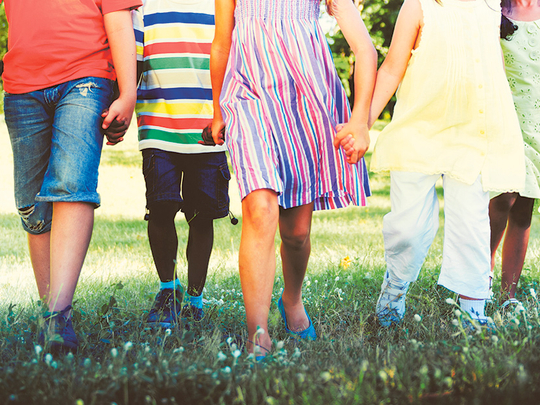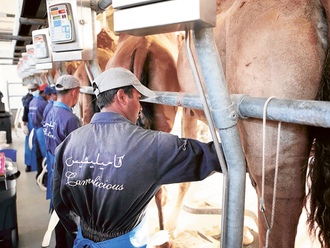
I recently attended a birthday party for the three-year-old daughter of my oldest friend, whom I’ve known since I was a baby. My father was the best man at his father’s wedding. Our lives have taken many turns, but here we are in adulthood with children the same age, spending much of our time together. It’s wonderful to know that my children will have the same history with his children. Many of my friends are people I have known since childhood, and those bonds have had a profound impact on my life.
Friendship is often underrated, considering the tremendous impact it has on our well being. Early-childhood friendship is something that is frequently overlooked as a positive developmental influence. We don’t always realise how attached young children are to their friends.
As a child, I moved at ages five, eight and 11. Each time I had to leave behind dear friends who had become a big part of my life. I am fortunate that my parents helped nurture those friendships, by helping me stay connected and encouraging me to continue these relationships into adulthood.
Recent research shows the importance of friendship, and its impact on mental and physical health. Preschool friendships are helpful in developing social and emotional skills, increasing a sense of belonging and decreasing stress. People who feel lonely or socially isolated tend to be more depressed, have more health issues and may have a shorter lifespan. Having a great support system can help us deal with those hardships that everyone faces at some point.
Paul Schwartz, a professor of psychology and child behaviour expert, has noted the many benefits of childhood friendship.
“Friendships contribute significantly to the development of social skills such as being sensitive to another’s viewpoints, learning the rules of conversation, and age-appropriate behaviours,” Schwartz has written in an article in the Hudson Valley Parent. “More than half the children referred for emotional behavioural problems have no friends or find difficulty interacting with peers.
“Friends also have a powerful influence on a child’s positive and negative school performance and may also help to encourage or discourage deviant behaviours,” he continues. “Compared to children who lack friends, children with ‘good’ friends have higher self-esteem, act more socially, can cope with life stresses and transitions, and are also less victimised by peers.”
Both boys and girls form strong attachments to others and both need social and emotional support. Unfortunately, stereotypes of boys often send the message that boys don’t feel as strongly or form the same type of attachments in their friendships, but this is inherently false. It is human nature to attach to certain people and to want closeness and support from others, regardless of gender.
At Powell Elementary School in Washington, the faculty makes an effort to place children in classes with others with whom they have established friendships. This is designed to help children maintain special bonds.
“I do not believe that children can learn if they do not feel comfortable and valued in the classroom,” says Amy Symonds, a prekindergarten teacher at Powell. Having strong relationships with their peers is one of the many factors that helps students feel welcome ... my main goal for students is to nurture their social-emotional development.
“I do think it is important for students to learn to work with all of their peers, but it is also important to help strengthen friendships that students have,” she adds. “As students begin navigating relationships and understanding the world outside of themselves, they notice peers with similar interests and who they enjoy being with. I want students to recognise these peers and continue to get to know them. I want students to engage in positive experiences as well as figure out what happens when they have a conflict with a friend.”
Jason Harris, another prekindergarten teacher at the school, said efforts to place children in classes with their friends have proven to be beneficial.
“This year I am sending half of my class to kindergarten,” Harris says. “Some students are nervous about the transition but they know they will be staying with some of their friends, which has eased their fears about the transition. They will still probably be nervous in the fall [autumn], but less so because they will have a few warm faces who are happy to see them when they step in that classroom for the first time.”
There is no one-size-fits-all formula for friendship; people thrive socially in different ways. There are, however, ways to help children develop relationship skills that will cultivate deep, meaningful connections with others. And it’s important to note that the benefits of friendship are based on quality, not quantity.
Here are some things parents can do to help their kids develop positive, warm friendships:
— Model the importance of staying connected. As I mentioned, my oldest friend is large in part an offshoot of my father’s friendship. Over the years, no matter where we lived, my parents maintained their important friendships. The ability to nurture my friendships was shaped by watching my parents’ dedication to their friendships.
— Model good friendship skills. Michele Borba, a parenting educator and author, suggests identifying one friendship skill your child lacks, then helping him develop it. If your child has trouble expressing feelings, for example, you could focus on doing that in a constructive way, either by sharing your own (“It makes me happy when you tell me you love me”), or by helping him label feelings (“Did it make you feel sad when your friend didn’t want to play with you?”).
— Encourage the friendships that are important to your child. If there is a relationship that brings your child joy, support it, even if the kids attend different schools. Scheduling time for them to see important friends outside of school, even if it’s only once in a while, helps them stay connected. Parents magazine has great resources for navigating childhood friendships on its website.
— Respect your child’s personality. Some children may have a lot of friends, and others may not need many friends to feel happy. It is important to celebrate and support your child’s personality and needs. One child may be more outgoing than a sibling and it’s important not to compare them, according to PBS’ website.









